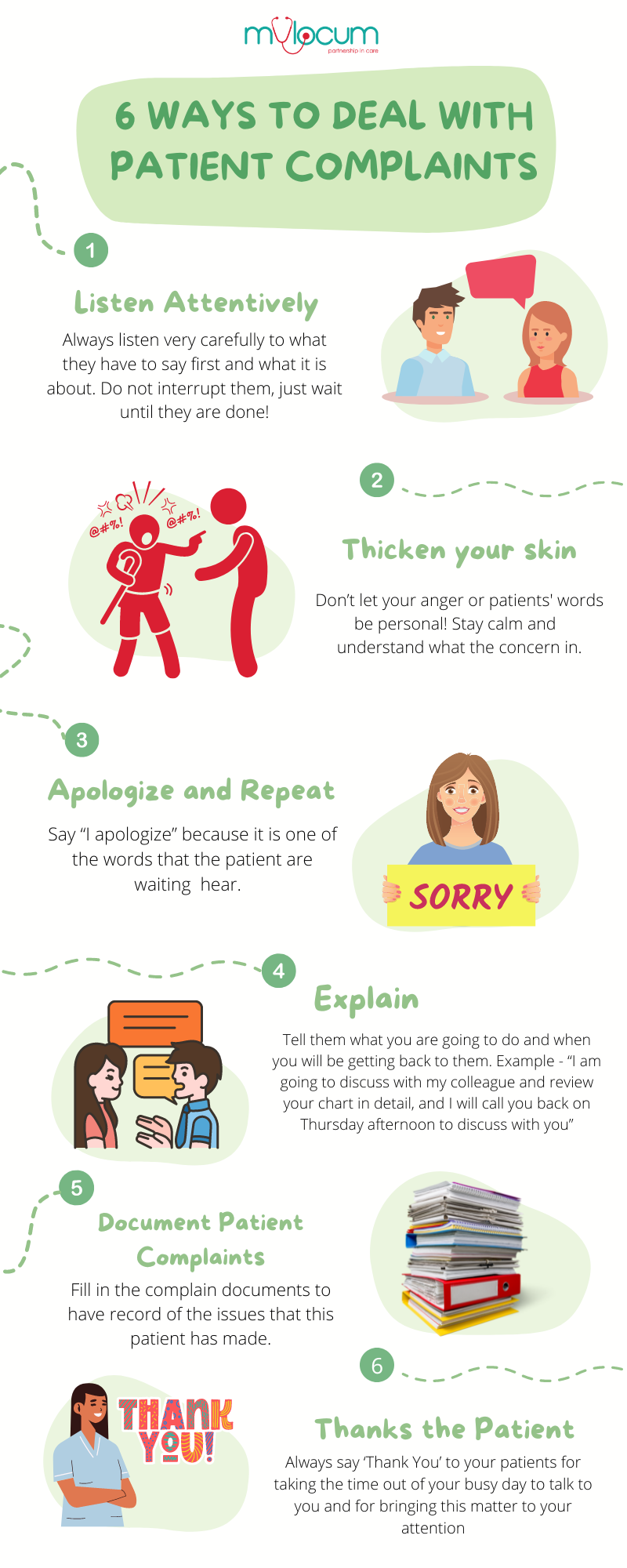
This article is about how to handle Patient Complaints and why patients might want to complain. This is a key factor for all healthcare workers to know when you have an unhappy patient that approaches you or calls you and shares their concerns this is a great opportunity to improve your skills.
Why might someone complain?
When a patient complains it is more common to be treated for treatment failure (15.6%) and problems with communication (13.7%) that were given to them by one of the staff members in hospitals or clinics. Once they complain, patients will let out a lot of anger and frustration towards you. It is important to know how to handle the situation to avoid having more complaints in the future because you wouldn’t want to ruin your reputation and the hospitals.
Below are a few other reasons why patients will complain:
- Failure to acknowledge symptoms
- Not listening to the patients
- Complications
- Simply dissatisfaction with the treatment or service
- Car parking issues
- Missing medical records
This is the Registered Mental Health (Band 5) we currently have in South East, Isle of Wight.We have plenty of vacancies on our website – Apply now: Job Section
How to deal with your patients complaints
Receiving complaints can get emotional for you because you will never know what the situation is all about and don’t know what to feel or do.
But don’t worry, we are here to guide you in what steps you should take when this happens. There are 6 ways you can handle the situation and how to diffuse their frustrations, shown in this infographic:

Listen Attentively
This is the first thing you must always keep in mind when a patient approaches an issue which is to always listen very carefully to what they have to say first and what it is about.
Do not interrupt them, just wait until they are done! Some patients will talk in a normal manner, but most people will vent their frustration and anger out because they are truly hurt by what the matter is.
Thicken your skin
Don’t let your anger or patients’ words be personal! You must be careful in what you say to the patient because one bad response can cause a lot more problems for you especially. So make sure you try to control your emotions.
Apologize and Repeat
After they have finished talking, say ‘sorry’ because it is a powerful word to say, and it is one of the words that the patient is waiting to hear.
It is a good idea to summarise what they have talked about with you, so that you have a clear understanding of what the concern is. This way it shows to your patient that you are listening and reassuring what the matter is. Don’t tell your patients that he/she is totally wrong, that will just make the issue even worse.
Explain
Once you have understood their concerns, you can now tell them what you are going to do and when you will be getting back to them.
For instance in reference to a treatment failure, “I am going to discuss with my colleague and review your chart in detail, and I will call you back on Thursday afternoon to discuss with you”. Make sure you give yourself enough time to investigate the situation, so you can know properly what is the real issue with the patients.
Do call your patient back on the day you said you will because if you don’t, they will complain more.
Document Patient Complaints
Now you must document the complaint that was raised on the day, no matter how small. When one complaint happens and another will keep on happening.
Thanks the Patient
Finally you must always say ‘Thank You’ to your patients for taking the time out of your busy day to talk to you and for bringing this matter to your attention.
This is the Community Children’s Nurse (Band 6) we currently have in London, Walthamstow.
Be Proactive – What to do next?
Keep in mind you don’t have to wait for patients to come whining to you. You should always ask the patients how they are doing because this will help you avoid getting complaints. For instance, you should ask them this when they are:
- Checking out of hospital
- Ask with surveys both online and by mail
- During appointments
- On regular call check ups
Keep in mind this is a great opportunity to learn and improve how to talk to angry patients. Wish you all the best!
You can go visit our website and you can go to the CV-Library to find more job opportunities for All Healthcare Workers.
